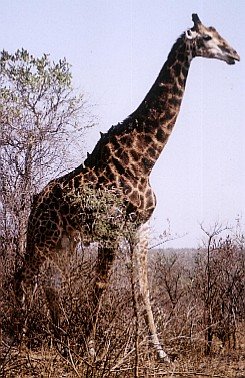
The best of both worlds.
 Trees offer life for some animals and birds out of the reach of predators.
Trees offer life for some animals and birds out of the reach of predators.
Life that depends on the integrity of man.







19-08-2008
The daisies are blooming on the field behind our house. There seem to be quite a lot of them. I want to go and check on Rietvlei to see if their removal of all the trees resulted in the expected fynbos paradise.
So it is official. The fynbos regards Aug. 19 as the first day of spring this year.
My mask weaver, in our front garden, has three females in nests. This morning I heard the sound of baby birds coming from one of them.
Yes Spring starts on Aug. 19 in Cape Town from now on.
20-08-2008
My garden
One of the Weaver chicks emerged from the nest this afternoon. I saw its mother feeding it while it sat on the edge of the feeder flapping its wings. It is a nice big fat chick; we must have put enough food out. I must admit the sounds coming from the nests when it is full of chicks always spurs me on to put a bit of extra whole wheat bread out a bit more frequently. I must do this quietly; because my husband say it is not fair to spoil the birds. I just can’t help feeling motherly towards them.
Even the female looks well fed, not as thin as one would expect a bird that spent the last few weeks sitting in the nest.
It is a lovely sunny (spring-August) day here in Cape Town.
=====================
19-08-2008
The daisies are blooming on the field behind our house. There seem to be quite a lot of them. I want to go and check on Rietvlei to see if their removal of all the trees resulted in the expected fynbos paradise.
So it is official. The fynbos regards Aug. 19 as the first day of spring this year.
My mask weaver, in our front garden, has three females in nests. This morning I heard the sound of baby birds coming from one of them.
The Cape Rietvlei (wetlands) Reserve has a brother in Gauteng.
This can confuse visitors.
Lets clear up the confusion.
Here are the links – Check them out.
Gauteng:
Table view, Cape Town:
There are no large animals at the Rietvlei Wetlands Nature Reserve in Cape Town.
Tourists can become confused if they rely on a web-search for information.
The Above links to the two areas have been separated
The Rietvlei Wetlands Reserve is in a process of transformation, as the trees are at present being removed to create an indigenous fynbos vegetation area.
The bird species that have been visiting the vlei may change as the habitat changes. At present, the place is a mess but will still be of interest for recreation and birding. See Milnerton Aquatic Club
The best view of Table Mountain is still to be viewed from here.
Tourists can obtain a seasonal membership at MAC Club and enjoy a drink while viewing the sunset over Table Mountain from the windows of the club’s comfortable pub.
Or just go for a safe stroll in nature. The area is completely fenced and is very safe.
Remember to take a hat or sun umbrella in the summer as there will be no shade to protect you from the sun.
Day visitors to the nature area are welcome for fishing, bird watching, boating, or a picnic with the family.
The area is well worth visiting and a small area of indigenous fynbos garden, which has been planted by the municipality a few years ago, is an example of how the vlei may look in the future.
Even with the surrounding houses in clear view, the area is still very peaceful.
Artificial watering of the dusty flood plain during the dry summer .months may be a distraction.
You may wish to check with MAC Club if the pumps are running to avoid the noise pollution.
The mountain view over the water is magnificent. Sometimes the water is like a mirror giving a double image to Table Mountain and the clouds above. Beautiful!
Ps. Remember Africa has two southern points also.
Cape point is the most Southern POINT of Africa but Cape L’Agulhas is the actual most Southern geographic Area of Africa. Both have their own unique beauty.
Tourists can visit both.